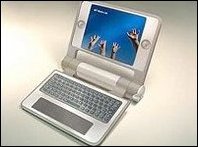
UN summit examines Internet governance, Global reach
[TamilNet, Sunday, 20 November 2005, 00:12 GMT]
World Summit on the Information Society (WSIS) sponsored by the United Nations for expanding Internet access around the world held in Tunisia between 16 to 18 November 2005 ended Friday with resolutions to narrow the digital divide and to increase access to children in the third world. Few committed funding for this ambitious vision. Questions related to continued control of the Internet by US-based private sector non-profit entity ICANN (Internet corporation for Assigned Names and Numbers) dominated the pre-conference discussions.
"The Internet is the result of, and indeed functions as, a unique and grand collaboration. If its benefits are to spread around the world, we must promote the same cooperative spirit among governments, the private sector, civil society and international organizations," UN Secretary General Kofi Annan said at the opening of the WSIS summit.

Dr Paul Twomey, CEO of ICANN (Photo: BBC)
ICANN established by the US government, controls key aspects of internet. Internet Protocol (IP) address space allocation, protocol identifier assignment, and generic ( .com, .net etc) and country code (such as .au, .uk) Domain name management. ICANN is also responsible for maintaining internet operational stability.
Many countries resent control by US Government. Iran, China and Brazil, for example, do not want their country code domains to be overseen by an entity which can turn hostile to them and can potentially impose restrictions on their country's domains.
However, negotiators from more than 100 countries agreed to leave the United States in charge of the Internet's addressing system, averting a US.-EU showdown but resentment over perceived U.S. control persisted. A new multinational committee has been appointed to look at issues on cybercrime, junk mail (spam), viruses and other internet problem areas.
ICANN's CEO Dr Paul Twomey defends the role of his non-profit organisation in supervising the internet, arguing against direct political control of the web.
Twomey scoffs at the often-heard refrain, "ICANN should not run the internet". He says: "ICANN does no such thing. If the internet were a postal system, the ICANN community ensures that the addresses on the envelopes work. What it does not do is determine what should be in the envelope, deliver the letter or decide who can read it. To give some idea of the scale of this task, ICANN's work ensures that nearly 250,000 interconnected private networks act as a single internet in the eyes of a billion users. These functions support more than 27 billion user sessions per day, about nine times the daily number of phone calls in North America," Twomey said in a National Public Radio (NPR) interview ahead of the UN summit.
Attendees also expressed concern on the free speech aspects of the internet and the need for UN to rein in on member states imposing censorship on the web.
Although ICANN controls a vital aspect of the internet, its authority does not extend to newer areas of big growth: instant messaging, peer-to-peer networks, Internet telephony (VoIP- Voice over IP), and the next big thing, IPTV.

The laptop will be more rugged and flexible than ordinary ones (Photo: BBC)
Nicholas Negroponte, chairman at MIT Media Lab, unveiled a $100 (£58) hand-cranked laptop which operates at 500MHz, or about half the speed of commercial laptops, and features a low-power display that can be switched from color to black and white to allow viewing in bright sunlight.
Google and media magnate Rupert Murdoch supported "One Laptop Per Child" non-profit group envisions millions of children in poor countries owning one resulting in a huge impact on their education.
Although initiatives to bring technology to developing countries have created optimism at the summit, to raise money for projects to link up the "global village," less was achieved in the summit in terms of concrete financial commitments to progress towards this goal.
Yoshio Utsumi, secretary-general of the International Telecommunications Union, which helped oversee the summit, said governments, private industry and others must follow through on agreements made this week.
The UN General Assembly endorsed the proposal by the International Telecommunications Union (ITU) in 2001 to hold the WSIS in two phases, with the first already held in Geneva in 2003 and the second in Tunisia which concluded last week.
External Links:












